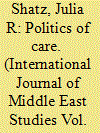| Srl | Item |
| 1 |
ID:
163880


|
|
|
|
|
| Summary/Abstract |
This article examines the work experiences of Palestinian Arab nurses to illuminate the operation of the colonial public health regime in Mandate Palestine. Analyzing nurses’ work in the clinics of town and village communities and their relationships with the colonial government's Department of Health, it argues that these nurses were social and political interlocutors in the system of public health, which depended upon their intimate relationships with local communities. By pulling these women out of the archives, this article complicates received wisdom among scholars about development, expertise, and the chronology of welfare. Telling the stories of these women also provides a ground-level view of the operation of daily governance in Mandate Palestine and the lived social, political, and economic realities of an often-overlooked cadre of Palestinian workers from that period.
|
|
|
|
|
|
|
|
|
|
|
|
|
|
|
|
| 2 |
ID:
168496


|
|
|
|
|
| Summary/Abstract |
Taking wartime nurses – and post-war nursing – seriously makes one think more politically about the wounds endured in wartime and what counts as a wartime ‘wound’. Thinking about wounds and the wounded, in turn, reveals how war-waging officials, and militarizers more generally, have tried in the past, and today still try, to shrink citizens’ awareness of militarism’s negative consequences. Nursing, nurses, wounds, and the wounded each continues to be gendered, influencing the workings of both masculinities and femininities in past and current wartimes and post-war politics. Feminist analysts have expanded the ‘political’ and multiplied ‘political thinkers’. Failing to absorb these feminist theoretical insights fosters the trivialization of nurses and other caretakers of the wartime wounded and their diverse political thinking. It is a failing with serious implications. Overlooking nurses and others who provide wartime care, combined with a lack of curiosity about wounds, perpetuates militarization and war.
|
|
|
|
|
|
|
|
|
|
|
|
|
|
|
|